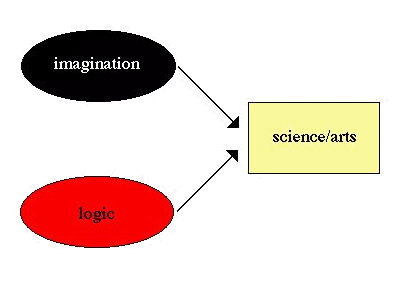
|
Science:
| Readings: Schneider & Arny: Unit 4, 10 |
| (Audio Lecture) |
The main purpose of science is to trace, within the chaos and flux of phenomena, a consistent structure with order and meaning. This is called the philosophy of rationalism, rational as in conforming with reason. And the purpose of scientific understanding is to coordinate our experiences and bring them into a logical system.
Science is any system of knowledge that is concerned with the physical world and its phenomena and that entails unbiased observations and systematic experimentation. In general, a science involves a pursuit of knowledge covering general truths or the operations of fundamental laws of nature.

Science is far from a perfect instrument of knowledge, but it provides something that other philosophies fail to, concrete results. Science is a ``candle in the dark'' to illuminate irrational beliefs or superstitions. Science does not, by itself, advocate courses of human action, but it can certainly illuminate the possible consequences of alternative courses. In this regard, science is both imaginative and disciplined, which is central to its power of prediction.
Science can be separated from pseudo-science by the principle of falsifiability, the concept that ideas must be capable of being proven false in order to be scientifically valid.
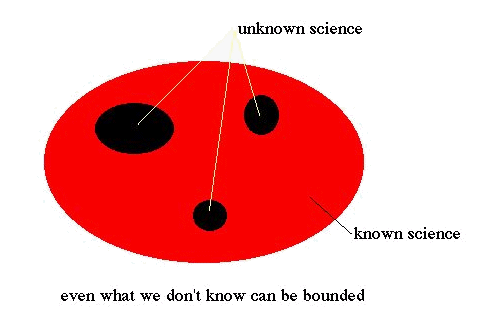
The keystone to science is evidence or data, which is not to be confused with certainty - for, except in pure mathematics, nothing is known for certain (although much is certainly false). Thus, we use the scientific method to address scientific issues.
Scientific arguments of logic basically take on four possible forms; 1) the pure method of deduction, where some conclusion is drawn from a set of propositions (i.e. pure logic), 2) the method of induction, where one draws general conclusions from particular facts that appear to serve as evidence, 3) by probability, which passes from frequencies within a known domain to conclusions of stated likelihood, and 4) by statistical reasoning, which concludes that, on the average, a certain percentage of a set of entities will satisfy the stated conditions. To support these methods, a scientist also uses a large amount of skepticism to search for any fallacies in arguments.

Of course, the main occupation of a scientist is problem solving with the goal of understanding the Universe.
Reductionism:
Reductionism is the belief that any complex set of phenomena can be defined or explained in terms of a relatively few simple or primitive ones.

To a reductionist, once a set of equations or mathematical relations has been found to describe a system, then the behavior of the system is considered to be explained.
Reductionism was widely accepted due to its power in prediction and formulation. It is, at least, a good approximation of the macroscopic world (although it is completely wrong for the microscope world, see quantum physics).
Too much success is a dangerous thing since the reductionist philosophy led to a wider paradigm, the methodology of scientism, the view that everything can and should be reduced to the properties of matter (materialism) such that emotion, aesthetics and religious experience can be reduced to biological instinct, chemical imbalances in the brain, etc. The 20th century reaction against reductionism is relativism. Modern science is somewhere in between.
Astronomy:
A common definition of astronomy is a science field that "deals with the stars and the planets". This is true, but only contains a fraction of what astronomy studies. Many people confuse astronomy with astrology. Astrology is a belief system in which the positions of the planets among the stars are thought to hold the key to understanding what you can expect from life. Most importantly, astrology is not a science.

While most astrologers were developing ways to predict the future of human events by careful observations of the sky, early astronomers were developing ways to predict the motions of the planets, Sun, and Moon. Most early astronomers were motivated by the idea that if they could accurately predict the motions of the planets then they would be able to accurately predict the future of persons. Astronomy broke away from astrology and became a science when astronomers became more interested in explaining what made the planets move the way they do and not in divining the future and interactions of individuals.
Unlike astronomy, astrology does not have objective observations of nature (experiments) determine the truth. Despite the fact that there is no foundation or logic behind astrology, millions still believe in it today. The classic test of astrology was performed by sociologist Michel Gaugelin who sent a horoscope of a mass murderer to 150 people but told each one that the horoscope was prepared just for him or her. Over ninety percent of them said they could see themselves in that horoscope. If a person is already convinced ahead of time of the validity of something like a horoscope or a psychic's prediction, then he or she will be easily able to use his or her natural problem-solving capabilities and creativity to make sense of the vague, even contradictory statements.
Astronomy involves many scientific disciplines and captures the imagination more than any other science due to its far-ranging inquiries.

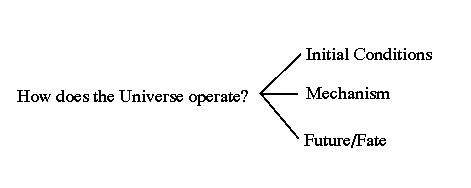
Astronomy differs from other sciences in that:
Angular Measure:
Measurements in astronomy are usually performed using trigonometry, a system of lengths and angular measures. Angular measure is used to denote apparent size, then deduce absolute size if distance to object is known.
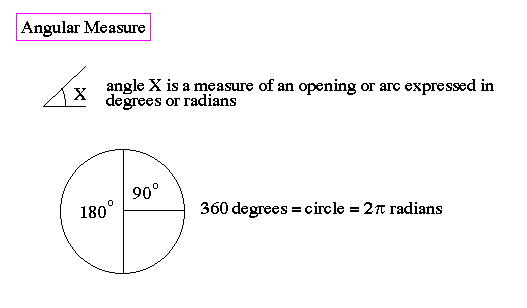
Exponents:
Exponents are powers of ten notation, a short-hand method of expressing very large and very small numbers.
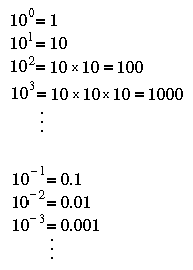
distance = velocity x time
1.496x108 km = 3.00x105 km/sec x time
time = 1.496x108 km/3.00x105 km/sec = 4.987x102 secs = 500 secs = 8 1/3 mins

|
|

|